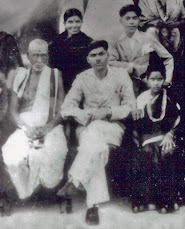All through I have been in one way or another drawing attention on the mind and its role in behaviour. The Buddha spoke of the mind as the primary organ - all the good or bad has its origin in the mind. Without going into the question of what is the nature of mind some practical points can considered.
 |
| By Unknown. via Wikimedia Commons |
Is then everything in mind? Is there no objective reality? I can only ask the poser of question to experiment with his own behaviour and its relation to his mind or mental content, with reference to any particular time and action.
Past experience creates basis for present imagination, and this imagination acts as the blueprint for present action. In a passive way this past pattern of behaviour and its memory projected as imagination lays the foundation for the perpetuation of recurring patterns of behaviour. It is as if one is helplessly going round and round like a bullock yoked to a mill stone.
I meet someone today. This person is apparently angry with me and refuses my request. I come home with this sequence in mind. Already my imagination has worked out the drama of my next possible encounter with the man: his possible arrogance, my ready retorts and so on. The next time when I meet him the scene has been set for a recurrence of the drama on a more elaborate but similar pattern. Stereotype is the most economical form of behaviour and also the least creative. Effort is necessary to break out of the shackles of past experience. And in this the role of imagination is supreme.
With some effort I can reorganise my memory of yesterday and recast my imagination for the next act. I can soon see that the whole central point in our meetings is being overshadowed by emotional reactions. I can also see that my perception is distorted or exaggerated. The reasons for the other person's anger may be many more than what I think them to be in reference to my very small self. The other person is as helplessly driven. Since I intend to be in control of my own behaviour I shall try to avoid verbal or gestural behaviour that tends to hurt. I shall politely seek to clarify points concerning the topic in hand. At least it will not complicate matters further.
Imagination is the bridge between will and action. Imagination sets the pattern for action and often it sabotages the will: often determines the will. Only effort can make imagination a good servant of the will.
Similar is the case with the perpetuation of chronic disease: 'Each winter I get asthma; I'm like a barometer! I am an extraordinary fellow, when I have migraine I lose my temper.’ Over a period of years a carefully nursed drama of total behaviour is inducted into the body and the whole richness of possible behaviour is made as an offering to the idol of illness with a disease label in Latin attached to it. There is nothing written as an unalterable law of nature that you should scowl if you have a headache. Most chronic disease is stereotype of behaviour systematised into channels of popularly and ‘scientifically’ cut patterns of uncreative behaviour.
Past experience, through the medium of imagination creates the mill of recurring history called human fate or destiny. The so-called past experiences is merely a selective memory or imagination of a situation with a million facets of which a few pieces satisfying the stultifying ego needs are nursed and treasured. If this highly selective memory forms the basis for my operational imagination I should be careful to become the master of my memories rather than their victim.
Today’s memories are the manure for tomorrow’s yield. Just as a good gardener carefully sifts the fallen leaves of yesterday from the stones in order to prepare the manure, so should I sift my memories. If I collect stones and thorns I should not wonder at the results for the morrow. Careful nurturing of pleasant memories is the most important foundation for making tomorrow pleasant and more creative than today.
Imagination and memory are faculties even like muscles; they need cultivation.
Whether imagination and memory are real or unreal does not concern the aspirant, who seeks to gain greater and greater control in his own behaviour. He will spend some time in careful experiment with the faculties of imagination and memory as they come to his awareness.








